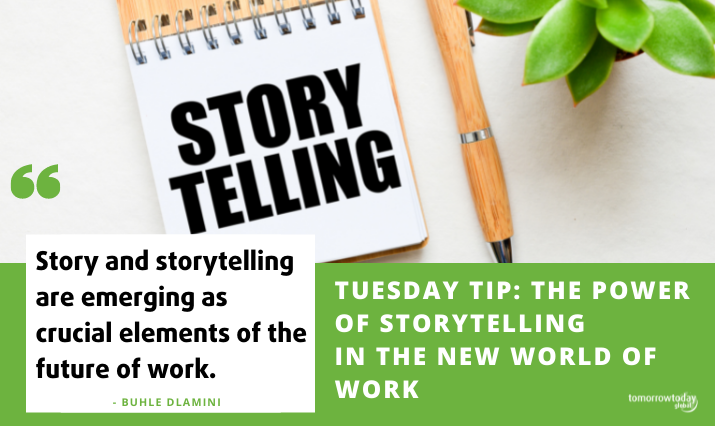How do you create an inclusive workplace when the workplace is everywhere? How do you cultivate a sense of belonging and purpose when your world is shifting right under your feet? These are some of the questions that leaders and managers are battling with in this new world of work. Story and storytelling are emerging as crucial elements of the future of work.
“We are all in this together” is a saying we have heard more than we would like to admit over the last year (2020/21). It is usually followed by another one… “We are all in the same boat”. Except, we are not in the same boat. We may be going through the same storm globally, nationally, or even organizationally but we are definitely not on the same boat.
It turns out that a crisis, and in particular a pandemic, has a way of highlighting all the ways we are not going through this challenge the same way.
Crises have a way of exposing the cracks and gaps that in ‘normal times’ are often papered over and simply ignored. With such a variety of experiences that your team may be going through in their personal lives that have now become part of their everyday ‘work-life’ it can be hard to create the same camaraderie that comes with being together. The injustices of our world caused by the ongoing systemic racism, societal patriarchy and many other forms of unequitable treatment affect our team members in different ways. If we want to create a truly inclusive workplace, we have to be willing to not only acknowledge these, but also appreciate how they affect our teams.
Storytelling is a very powerful way to create greater connection between people that can often lead to empathy and action. Heartlines, a South African non-profit institute promoting social cohesion and positive values, started a story telling initiative called ‘What’s Your Story’. This initiative, that I have been part of, has been encouraging people in all spheres of society to create greater connections by sharing personal stories. Companies, schools, churches, community groups have been engaging in story telling sessions (in small groups) that have led to greater understanding and often many practical initiatives.
One example is that of a Johannesburg based, middle-aged, white male executive. He was touched by stories of many of his younger black female team members being subjected to daily harassment when they walked the short distance from the office to the Mall on their lunch break. He offered to drive them and pick them up whenever he could, other men have joined in the lunch shifts, completely voluntary. This is a great example when we are in the office environment, but what about now when we are either in completely virtual or hybrid teams?
Sharing in story telling during this period can help people feel seen and heard but also create greater understanding. Some teams are starting their virtual team meetings with storytelling of some form, like giving 10 minutes to one member a week to share their life story briefly, until everyone has had a chance. This can be followed by starting every meeting with some form of storytelling for example everyone gets 1 min to share about one of these:
- “What I am Learning.”
- “What I am Doing to Cope.”
- “What I Am Struggling With.”
- “My Current Source Joy/Enjoyment/Fun”
There are as many different iterations of these personal storytelling triggers you can use with your team as your imagination will allow. There are also many other tools you can use for storytelling that are available online. You can also put your own guidelines and rules in place if you have concerns about emotional safety, but the key is to lead by example. If the leaders are willing to be vulnerable, it creates a conducive environment for openness.
Storytelling can help team members connect at a deeper level, create opportunities for learning about others and their experiences and help minimize divisions created by race, gender, orientation, ability and socio-economic differences. Once you know my story it is harder to hold on to preconceived stereotypes and prejudices brought on by our unconscious biases. Why don’t you try this in some form and see how your team benefits?
Buhle can help your team with Creating Inclusive Culture, he continues to help teams and organisations Unleash Their Greatness with online sessions, keynote presentations and webinars.
About the author of today’s Tuesday Tip – Buhle Dlamini
Buhle Dlamini is a globally sought after speaker who helps organisations unleash their greatness and create an inclusive culture. Request Buhle to talk to your team about the 5 Key Ingredients of a thriving hybrid team.
Buhle continues to also help teams and organisations Unleash Their Greatness with online sessions, keynote presentations and webinars.



Trackbacks/Pingbacks